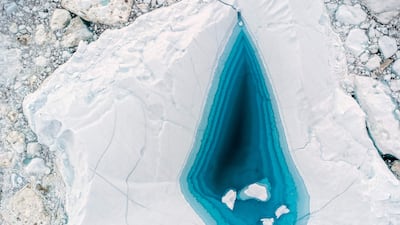Eight years of the highest recorded global temperatures have caused “off the charts” glacier melting, the World Meteorological Organisation said on Friday.
Sea levels are also at a record high, having risen by an average of 4.62 millimetres per year between 2013 and 2022 — double the rate it was between 1993 and 2002.
Record high temperatures were observed in the oceans — where about 90 per cent of the heat trapped on Earth by greenhouse gases ends up.
The WMO's State of the Global Climate 2022 report highlighted a number of troubling trends in climate change, including record concentrations of greenhouse gases, highest global temperatures over the last eight years and melting glaciers.
“While greenhouse gas emissions continue to rise and the climate continues to change, populations worldwide continue to be gravely affected by extreme weather and climate events,” said Prof Petteri Taalas, secretary general of the WMO .
“For example, in 2022, continuous drought in East Africa, record-breaking rainfall in Pakistan and record-breaking heatwaves in China and Europe affected tens of millions, drove food insecurity, boosted mass migration, and cost billions of dollars in loss and damage.”

Prof Taalas said, to even begin to tackle these issues, better tracking of climate change needs to be brought in. About 100 countries do not have adequate weather services in place, he said.
Under the 2015 Paris Agreement, countries agreed to cap global warming at “well below” 2°C above average levels measured between 1850 and 1900 — and 1.5°C if possible.
But the heat continues to rise. The global mean temperature in 2022 was 1.15°C above the 1850-1900 average, the WMO report said.
Levels of the three main greenhouse gases were also elevated.
Carbon dioxide, methane, and nitrous oxide concentrations were at their highest on record from 2020 to 2021, with 2022 data appearing to show yet more increases.
This is despite a number of technological and environmental solutions and preventive actions being available.
“We have the tools, the knowledge, and the solutions. But we must pick up the pace. We need accelerated climate action with deeper, faster emissions cuts to limit global temperature rise to 1.5 degree Celsius. We also need massively scaled-up investments in adaptation and resilience, particularly for the most vulnerable countries and communities who have done the least to cause the crisis,” said UN Secretary-General António Guterres.
The world's reference glaciers — those for which long-term observations exist — saw an average thickness loss of more than 1.3 metres between October 2021 and October 2022 — a loss much larger than the average over the last decade.
The cumulative thickness loss since 1970 amounts to almost 30 metres.
“Antarctic sea ice fell to its lowest extent on record and the melting of some European glaciers was, literally, off the charts,” the WMO spelt out as it launched its annual climate overview.
Despite the report's bad news, Prof Taalas said there was cause for some optimism.

He said the means to battle climate change were becoming more affordable, with green energy becoming cheaper than fossil fuels, while the world was developing better mitigation methods.
The planet is no longer heading towards 3°C-5°C warming, as forecast in 2014, but was now on track for 2.5°C-3°C warming, he said.
“In the best case, we would still be able to reach 1.5°C warming, which would be best for the welfare of mankind, the biosphere and the global economy,” the WMO secretary-general said.
Prof Taalas said 32 countries had reduced their emissions and their economies still grew.
“There is no more automatic link between economic growth and emissions growth,” he said.
In stark contrast to the world leaders of 10 years ago, now “practically all of them are talking about climate change as a serious problem and countries have started acting”, he said.

